The 1980s
If Dennis Rader had enjoyed all the publicity BTK was getting in the late 1970s, he must have grown increasingly wary of being caught. Ahead in the game, he knew when to fold it. Nothing more was heard from the killer publicly until 2004, except for one letter that was not officially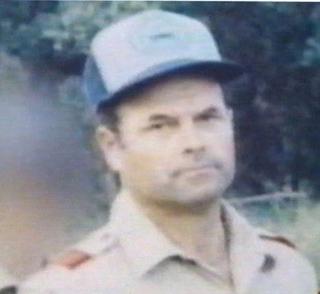 acknowledged to have come from BTK in 1988. Rader continued his trolling while becoming more active in his church and also became a Cub Scout leader when his son was old enough. In fact, son Brian would eventually attain the status of Eagle Scout, undoubtedly with ample encouragement and guidance from his father. Rader never utilized his degree in Administation of Justice from WSU, but was known to have envied becoming a police officer and was also reportedly involved at times in reserve officer programs as a volunteer.
acknowledged to have come from BTK in 1988. Rader continued his trolling while becoming more active in his church and also became a Cub Scout leader when his son was old enough. In fact, son Brian would eventually attain the status of Eagle Scout, undoubtedly with ample encouragement and guidance from his father. Rader never utilized his degree in Administation of Justice from WSU, but was known to have envied becoming a police officer and was also reportedly involved at times in reserve officer programs as a volunteer.
It is impossible to understand the story of Dennis Rader unless one has some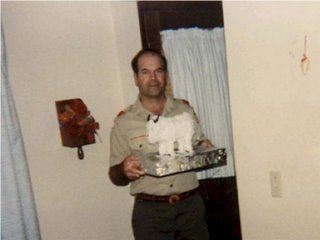 knowledge of what a psychopath is. A psychopath is a person who is incapable of empathy for other beings. They are self-centered to the extreme that no one else matters unless someone serves a purpose or potential purpose for the psychopath. This is a person who has no problems with hurting others, no guilt, shame or remorse. It is a person who is deceptive, lies freely and skillfully without shame or regret. Dennis Rader from his youth learned how to live in two worlds, the conventional, social realm everyone lives in and his own private world of torture and death. He was extremely skillful in separating these two worlds, what is known as compartmentalizing. He could go out and commit the most atrocious murder, and come home like nothing had happened. It was like changing clothes or switching to a different channel.
knowledge of what a psychopath is. A psychopath is a person who is incapable of empathy for other beings. They are self-centered to the extreme that no one else matters unless someone serves a purpose or potential purpose for the psychopath. This is a person who has no problems with hurting others, no guilt, shame or remorse. It is a person who is deceptive, lies freely and skillfully without shame or regret. Dennis Rader from his youth learned how to live in two worlds, the conventional, social realm everyone lives in and his own private world of torture and death. He was extremely skillful in separating these two worlds, what is known as compartmentalizing. He could go out and commit the most atrocious murder, and come home like nothing had happened. It was like changing clothes or switching to a different channel.
By 1985 as far as anyone knows, it had been a number of years since the last kill. Rader was a busy family man, a person with no criminal record, someone apparently religious and helpful at church. Despite all this he took great lengths to pull off his next murder. He was now 40 years old, his son was 9 and his daughter 6. Marine Hedge,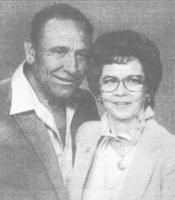 53, was a widowed neighbor who lived on the same street in Park City as the Raders. She was a petite, friendly woman, mother of four grown children, who had lost her husband Thomas in the past year. In the 1970s the Raders had purchased their small home on Independence Street. During their walks Dennis and Paula would sometimes wave to Marine, who enjoyed gardening around the home as did Dennis.
53, was a widowed neighbor who lived on the same street in Park City as the Raders. She was a petite, friendly woman, mother of four grown children, who had lost her husband Thomas in the past year. In the 1970s the Raders had purchased their small home on Independence Street. During their walks Dennis and Paula would sometimes wave to Marine, who enjoyed gardening around the home as did Dennis.
On the weekend of April 27, 1985, Rader was attending a Boy Scout camp-out just outside of Wichita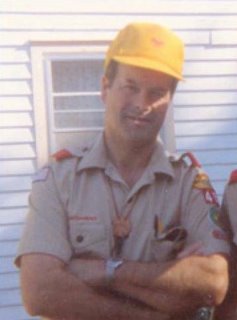 . He left camp in the evening, with the pretext of having a headache and needing to get to town to buy something for it. He parked his car by a bowling alley in the city and bought himself a beer. He swished the liquid in his mouth and spit it out, and also deliberately got some beer on his clothing so he would have a smell like he had been drinking. Calling a cab, he pretended to be drunk and instructed the driver to take him to a park in Park City so he could walk it off before arriving home. The park adjoined the backyard of the Hedge property. Rader was
. He left camp in the evening, with the pretext of having a headache and needing to get to town to buy something for it. He parked his car by a bowling alley in the city and bought himself a beer. He swished the liquid in his mouth and spit it out, and also deliberately got some beer on his clothing so he would have a smell like he had been drinking. Calling a cab, he pretended to be drunk and instructed the driver to take him to a park in Park City so he could walk it off before arriving home. The park adjoined the backyard of the Hedge property. Rader was disappointed to see Marine's car in the carport, and assumed she was home. He cut the phone line and quietly pried open a rear door using a screwdriver. It turned out that no one was home as he had hoped, and after a while a car pulled up and Rader hid in a bedroom closet. Marine Hedge and a male friend entered the home. The man left for the night around 1 a.m. Rader waited while Marine went to bed and fell asleep.
disappointed to see Marine's car in the carport, and assumed she was home. He cut the phone line and quietly pried open a rear door using a screwdriver. It turned out that no one was home as he had hoped, and after a while a car pulled up and Rader hid in a bedroom closet. Marine Hedge and a male friend entered the home. The man left for the night around 1 a.m. Rader waited while Marine went to bed and fell asleep.
Rader crept out of the closet. He flicked on the bathroom light and then pounced on Marine in the bed, manually choking the 100 pound woman to death. However, his fantasy-driven outing was far from over. He dragged the body with the bedding to her car and put her in the trunk. Rader drove directly to his church, where he was a person so trusted that he had the keys to the building. He dragged the body underneath some trees and entered the building down to the basement, where he taped black plastic over the basement windows so no one could see inside. He then dragged the body down into the basement and photographed it in various poses. It was getting late and Rader hurriedly returned the body to the car trunk and took off.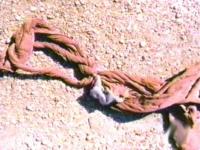 He found a dumping place in a ditch along a dirt road several miles outside of Park City, and semi-concealed the body under some trimmings. He left knotted pantyhose by the body, which apparently had been used for some purpose during the night. At one point Rader had dropped the car key onto the dashboard and the key slid down and wedged under the windshield. He used a rock to smash a corner of the windshield to retrieve the key.
He found a dumping place in a ditch along a dirt road several miles outside of Park City, and semi-concealed the body under some trimmings. He left knotted pantyhose by the body, which apparently had been used for some purpose during the night. At one point Rader had dropped the car key onto the dashboard and the key slid down and wedged under the windshield. He used a rock to smash a corner of the windshield to retrieve the key.
By now it was getting light and Rader hurriedly made his way back to where he had left his car in Wichita. He parked Marine's car there after wiping it down for fingerprints, and returned to the Scout camp he had deserted earlier. He was never connected to this crime until some 20 years later. He still had those photographs in his collection.
 In September, 1986 Rader had his eye on Vicki Wegerle, a 28 year old mother of two. He would walk by her house, hearing strains of piano music as Vickie played. On September 16 he took some time out for a "PJ" or project, as he called his murder prospects. Sometime after 10 a.m. he showed up at Vickie's door, dressed up like a telephone repairman complete with hardhat. He somehow managed to get Vicki to allow him inside the home to check the phone line. He fiddled with her phone with an improvised testing gadget and then informed her she was going to be tied up. Presumably using a gun, he forced her into a bedroom and attempted to tie her up, but she gave him a fierce battle scratching him in the process. Rader prevailed in the physical fight and secured her with ropes, then proceeded to strangle her to death using pantyhose as a ligature. He photographed the dying body in a few poses and hastily left in the Wegerle car. Vicki had warned him that her husband would be arriving home shortly. Rader later stated that had the husband come home, he would have been killed also.
In September, 1986 Rader had his eye on Vicki Wegerle, a 28 year old mother of two. He would walk by her house, hearing strains of piano music as Vickie played. On September 16 he took some time out for a "PJ" or project, as he called his murder prospects. Sometime after 10 a.m. he showed up at Vickie's door, dressed up like a telephone repairman complete with hardhat. He somehow managed to get Vicki to allow him inside the home to check the phone line. He fiddled with her phone with an improvised testing gadget and then informed her she was going to be tied up. Presumably using a gun, he forced her into a bedroom and attempted to tie her up, but she gave him a fierce battle scratching him in the process. Rader prevailed in the physical fight and secured her with ropes, then proceeded to strangle her to death using pantyhose as a ligature. He photographed the dying body in a few poses and hastily left in the Wegerle car. Vicki had warned him that her husband would be arriving home shortly. Rader later stated that had the husband come home, he would have been killed also.
 Bill Wegerle indeed came home soon afterward and even saw his own car going in the opposite direction away from the house. He couldn't identify the driver, but it didn't appear to be Vicki. His 2 year old son Brandon was still in the living room, unattended. Bill couldn't find Vicki at first, who was on the bedroom floor behind the bed, but finally did after a while. She was rushed to a hospital with paramedics desperately trying to revive her, but was pronounced dead a short time later.
Bill Wegerle indeed came home soon afterward and even saw his own car going in the opposite direction away from the house. He couldn't identify the driver, but it didn't appear to be Vicki. His 2 year old son Brandon was still in the living room, unattended. Bill couldn't find Vicki at first, who was on the bedroom floor behind the bed, but finally did after a while. She was rushed to a hospital with paramedics desperately trying to revive her, but was pronounced dead a short time later.
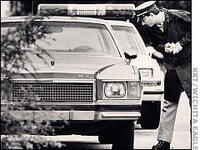 BTK meanwhile had driven around the city for a while disposing of evidence, then returned to the area near the house and parked the Wegerle's car a couple blocks from their home. He exited the area on foot and returned to his own car nearby. Changing clothes, he escaped all detection for this crime and was never suspected of it.
BTK meanwhile had driven around the city for a while disposing of evidence, then returned to the area near the house and parked the Wegerle's car a couple blocks from their home. He exited the area on foot and returned to his own car nearby. Changing clothes, he escaped all detection for this crime and was never suspected of it.
 Bill Wegerle's life soon took a turn for the drastic. Not only had he lost his wife and mother of his two children, he was faced with a hostile and skeptical police and public who never seemed satisfied that he was innocent of this crime. This dark cloud of suspicion hung over him for the next 18 years. Nobody had heard from BTK in eight years and the police discounted this as a BTK crime. No charges were ever filed against Bill, but the anguish of those years was keen. (Photo and a story about the Wegerle family from CBSnews.com and the program 48 Hours Mystery).
Bill Wegerle's life soon took a turn for the drastic. Not only had he lost his wife and mother of his two children, he was faced with a hostile and skeptical police and public who never seemed satisfied that he was innocent of this crime. This dark cloud of suspicion hung over him for the next 18 years. Nobody had heard from BTK in eight years and the police discounted this as a BTK crime. No charges were ever filed against Bill, but the anguish of those years was keen. (Photo and a story about the Wegerle family from CBSnews.com and the program 48 Hours Mystery).
At the very end of 1987 another notorious family murder occurred in Wichita, this time three members of the Phillip Fager family: the father, Phillip, and two teenage daughters. A contractor who worked for the Fagers was arrested in Florida after leaving the murder scene in the Fager car and using a credit card stolen from them. Bill Butterworth was eventually acquitted by a jury due to a lack of physical evidence, but the police remain satisfied that he was the murderer. A letter was received by Mrs. Fager in early 1988 from BTK, who stated he did not do this crime but admired the work of the man who did. This was never confirmed as a genuine BTK communication until police found a copy of the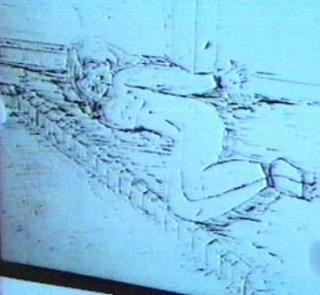 original letter in Rader's stash 17 years later. He also had his own illustration of what he thought had happened that day to one of the girls, but it was not accurate to the real crime scene.
original letter in Rader's stash 17 years later. He also had his own illustration of what he thought had happened that day to one of the girls, but it was not accurate to the real crime scene.
In 1988 Rader succeeded in getting himself fired from ADT Security. The official reason stated by the company was that he was not getting his work quota done. The varying reports from co-workers describe a man who could be difficult to work with but was customer-oriented. One description of him from that time paints a picture of a man who wanted to be a police officer but had been forced to settle for what Rader saw as the inferior position of being an alarm installer. In any case, he was out of a steady job. There is a record of Rader working for the US Census Bureau for several months in 1989 as a field operations supervisor. Apparently he was promoted to a state supervisory position after that in connection with the 1990 census. It afforded him ample opportunity to travel within Kansas, which Rader says he used to add more potential projects in various locations around the state.
Next: 1990-2003
 acknowledged to have come from BTK in 1988. Rader continued his trolling while becoming more active in his church and also became a Cub Scout leader when his son was old enough. In fact, son Brian would eventually attain the status of Eagle Scout, undoubtedly with ample encouragement and guidance from his father. Rader never utilized his degree in Administation of Justice from WSU, but was known to have envied becoming a police officer and was also reportedly involved at times in reserve officer programs as a volunteer.
acknowledged to have come from BTK in 1988. Rader continued his trolling while becoming more active in his church and also became a Cub Scout leader when his son was old enough. In fact, son Brian would eventually attain the status of Eagle Scout, undoubtedly with ample encouragement and guidance from his father. Rader never utilized his degree in Administation of Justice from WSU, but was known to have envied becoming a police officer and was also reportedly involved at times in reserve officer programs as a volunteer.It is impossible to understand the story of Dennis Rader unless one has some
 knowledge of what a psychopath is. A psychopath is a person who is incapable of empathy for other beings. They are self-centered to the extreme that no one else matters unless someone serves a purpose or potential purpose for the psychopath. This is a person who has no problems with hurting others, no guilt, shame or remorse. It is a person who is deceptive, lies freely and skillfully without shame or regret. Dennis Rader from his youth learned how to live in two worlds, the conventional, social realm everyone lives in and his own private world of torture and death. He was extremely skillful in separating these two worlds, what is known as compartmentalizing. He could go out and commit the most atrocious murder, and come home like nothing had happened. It was like changing clothes or switching to a different channel.
knowledge of what a psychopath is. A psychopath is a person who is incapable of empathy for other beings. They are self-centered to the extreme that no one else matters unless someone serves a purpose or potential purpose for the psychopath. This is a person who has no problems with hurting others, no guilt, shame or remorse. It is a person who is deceptive, lies freely and skillfully without shame or regret. Dennis Rader from his youth learned how to live in two worlds, the conventional, social realm everyone lives in and his own private world of torture and death. He was extremely skillful in separating these two worlds, what is known as compartmentalizing. He could go out and commit the most atrocious murder, and come home like nothing had happened. It was like changing clothes or switching to a different channel.By 1985 as far as anyone knows, it had been a number of years since the last kill. Rader was a busy family man, a person with no criminal record, someone apparently religious and helpful at church. Despite all this he took great lengths to pull off his next murder. He was now 40 years old, his son was 9 and his daughter 6. Marine Hedge,
 53, was a widowed neighbor who lived on the same street in Park City as the Raders. She was a petite, friendly woman, mother of four grown children, who had lost her husband Thomas in the past year. In the 1970s the Raders had purchased their small home on Independence Street. During their walks Dennis and Paula would sometimes wave to Marine, who enjoyed gardening around the home as did Dennis.
53, was a widowed neighbor who lived on the same street in Park City as the Raders. She was a petite, friendly woman, mother of four grown children, who had lost her husband Thomas in the past year. In the 1970s the Raders had purchased their small home on Independence Street. During their walks Dennis and Paula would sometimes wave to Marine, who enjoyed gardening around the home as did Dennis.On the weekend of April 27, 1985, Rader was attending a Boy Scout camp-out just outside of Wichita
 . He left camp in the evening, with the pretext of having a headache and needing to get to town to buy something for it. He parked his car by a bowling alley in the city and bought himself a beer. He swished the liquid in his mouth and spit it out, and also deliberately got some beer on his clothing so he would have a smell like he had been drinking. Calling a cab, he pretended to be drunk and instructed the driver to take him to a park in Park City so he could walk it off before arriving home. The park adjoined the backyard of the Hedge property. Rader was
. He left camp in the evening, with the pretext of having a headache and needing to get to town to buy something for it. He parked his car by a bowling alley in the city and bought himself a beer. He swished the liquid in his mouth and spit it out, and also deliberately got some beer on his clothing so he would have a smell like he had been drinking. Calling a cab, he pretended to be drunk and instructed the driver to take him to a park in Park City so he could walk it off before arriving home. The park adjoined the backyard of the Hedge property. Rader was disappointed to see Marine's car in the carport, and assumed she was home. He cut the phone line and quietly pried open a rear door using a screwdriver. It turned out that no one was home as he had hoped, and after a while a car pulled up and Rader hid in a bedroom closet. Marine Hedge and a male friend entered the home. The man left for the night around 1 a.m. Rader waited while Marine went to bed and fell asleep.
disappointed to see Marine's car in the carport, and assumed she was home. He cut the phone line and quietly pried open a rear door using a screwdriver. It turned out that no one was home as he had hoped, and after a while a car pulled up and Rader hid in a bedroom closet. Marine Hedge and a male friend entered the home. The man left for the night around 1 a.m. Rader waited while Marine went to bed and fell asleep.Rader crept out of the closet. He flicked on the bathroom light and then pounced on Marine in the bed, manually choking the 100 pound woman to death. However, his fantasy-driven outing was far from over. He dragged the body with the bedding to her car and put her in the trunk. Rader drove directly to his church, where he was a person so trusted that he had the keys to the building. He dragged the body underneath some trees and entered the building down to the basement, where he taped black plastic over the basement windows so no one could see inside. He then dragged the body down into the basement and photographed it in various poses. It was getting late and Rader hurriedly returned the body to the car trunk and took off.
 He found a dumping place in a ditch along a dirt road several miles outside of Park City, and semi-concealed the body under some trimmings. He left knotted pantyhose by the body, which apparently had been used for some purpose during the night. At one point Rader had dropped the car key onto the dashboard and the key slid down and wedged under the windshield. He used a rock to smash a corner of the windshield to retrieve the key.
He found a dumping place in a ditch along a dirt road several miles outside of Park City, and semi-concealed the body under some trimmings. He left knotted pantyhose by the body, which apparently had been used for some purpose during the night. At one point Rader had dropped the car key onto the dashboard and the key slid down and wedged under the windshield. He used a rock to smash a corner of the windshield to retrieve the key.By now it was getting light and Rader hurriedly made his way back to where he had left his car in Wichita. He parked Marine's car there after wiping it down for fingerprints, and returned to the Scout camp he had deserted earlier. He was never connected to this crime until some 20 years later. He still had those photographs in his collection.
 In September, 1986 Rader had his eye on Vicki Wegerle, a 28 year old mother of two. He would walk by her house, hearing strains of piano music as Vickie played. On September 16 he took some time out for a "PJ" or project, as he called his murder prospects. Sometime after 10 a.m. he showed up at Vickie's door, dressed up like a telephone repairman complete with hardhat. He somehow managed to get Vicki to allow him inside the home to check the phone line. He fiddled with her phone with an improvised testing gadget and then informed her she was going to be tied up. Presumably using a gun, he forced her into a bedroom and attempted to tie her up, but she gave him a fierce battle scratching him in the process. Rader prevailed in the physical fight and secured her with ropes, then proceeded to strangle her to death using pantyhose as a ligature. He photographed the dying body in a few poses and hastily left in the Wegerle car. Vicki had warned him that her husband would be arriving home shortly. Rader later stated that had the husband come home, he would have been killed also.
In September, 1986 Rader had his eye on Vicki Wegerle, a 28 year old mother of two. He would walk by her house, hearing strains of piano music as Vickie played. On September 16 he took some time out for a "PJ" or project, as he called his murder prospects. Sometime after 10 a.m. he showed up at Vickie's door, dressed up like a telephone repairman complete with hardhat. He somehow managed to get Vicki to allow him inside the home to check the phone line. He fiddled with her phone with an improvised testing gadget and then informed her she was going to be tied up. Presumably using a gun, he forced her into a bedroom and attempted to tie her up, but she gave him a fierce battle scratching him in the process. Rader prevailed in the physical fight and secured her with ropes, then proceeded to strangle her to death using pantyhose as a ligature. He photographed the dying body in a few poses and hastily left in the Wegerle car. Vicki had warned him that her husband would be arriving home shortly. Rader later stated that had the husband come home, he would have been killed also. Bill Wegerle indeed came home soon afterward and even saw his own car going in the opposite direction away from the house. He couldn't identify the driver, but it didn't appear to be Vicki. His 2 year old son Brandon was still in the living room, unattended. Bill couldn't find Vicki at first, who was on the bedroom floor behind the bed, but finally did after a while. She was rushed to a hospital with paramedics desperately trying to revive her, but was pronounced dead a short time later.
Bill Wegerle indeed came home soon afterward and even saw his own car going in the opposite direction away from the house. He couldn't identify the driver, but it didn't appear to be Vicki. His 2 year old son Brandon was still in the living room, unattended. Bill couldn't find Vicki at first, who was on the bedroom floor behind the bed, but finally did after a while. She was rushed to a hospital with paramedics desperately trying to revive her, but was pronounced dead a short time later. BTK meanwhile had driven around the city for a while disposing of evidence, then returned to the area near the house and parked the Wegerle's car a couple blocks from their home. He exited the area on foot and returned to his own car nearby. Changing clothes, he escaped all detection for this crime and was never suspected of it.
BTK meanwhile had driven around the city for a while disposing of evidence, then returned to the area near the house and parked the Wegerle's car a couple blocks from their home. He exited the area on foot and returned to his own car nearby. Changing clothes, he escaped all detection for this crime and was never suspected of it. Bill Wegerle's life soon took a turn for the drastic. Not only had he lost his wife and mother of his two children, he was faced with a hostile and skeptical police and public who never seemed satisfied that he was innocent of this crime. This dark cloud of suspicion hung over him for the next 18 years. Nobody had heard from BTK in eight years and the police discounted this as a BTK crime. No charges were ever filed against Bill, but the anguish of those years was keen. (Photo and a story about the Wegerle family from CBSnews.com and the program 48 Hours Mystery).
Bill Wegerle's life soon took a turn for the drastic. Not only had he lost his wife and mother of his two children, he was faced with a hostile and skeptical police and public who never seemed satisfied that he was innocent of this crime. This dark cloud of suspicion hung over him for the next 18 years. Nobody had heard from BTK in eight years and the police discounted this as a BTK crime. No charges were ever filed against Bill, but the anguish of those years was keen. (Photo and a story about the Wegerle family from CBSnews.com and the program 48 Hours Mystery).At the very end of 1987 another notorious family murder occurred in Wichita, this time three members of the Phillip Fager family: the father, Phillip, and two teenage daughters. A contractor who worked for the Fagers was arrested in Florida after leaving the murder scene in the Fager car and using a credit card stolen from them. Bill Butterworth was eventually acquitted by a jury due to a lack of physical evidence, but the police remain satisfied that he was the murderer. A letter was received by Mrs. Fager in early 1988 from BTK, who stated he did not do this crime but admired the work of the man who did. This was never confirmed as a genuine BTK communication until police found a copy of the
 original letter in Rader's stash 17 years later. He also had his own illustration of what he thought had happened that day to one of the girls, but it was not accurate to the real crime scene.
original letter in Rader's stash 17 years later. He also had his own illustration of what he thought had happened that day to one of the girls, but it was not accurate to the real crime scene.In 1988 Rader succeeded in getting himself fired from ADT Security. The official reason stated by the company was that he was not getting his work quota done. The varying reports from co-workers describe a man who could be difficult to work with but was customer-oriented. One description of him from that time paints a picture of a man who wanted to be a police officer but had been forced to settle for what Rader saw as the inferior position of being an alarm installer. In any case, he was out of a steady job. There is a record of Rader working for the US Census Bureau for several months in 1989 as a field operations supervisor. Apparently he was promoted to a state supervisory position after that in connection with the 1990 census. It afforded him ample opportunity to travel within Kansas, which Rader says he used to add more potential projects in various locations around the state.
Next: 1990-2003
<< Back to Chapter 1